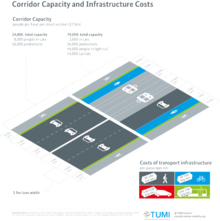This article needs additional citations for verification. (August 2018) |

In transport economics, the generalised cost is the sum of the monetary and non-monetary costs of a journey.[1][2] It is sometimes used as a basis for judgements of transit accessibility and equitable distribution of public transit resources.[3]
Monetary (or "out-of-pocket") costs might include a fare on a public transport journey, or the costs of fuel, wear and tear and any parking charge, toll or congestion charge on a car journey.
Non-monetary costs refer to the time spent undertaking the journey. Time is converted to a money value using a value of time figure, which usually varies according to the traveller's income and the purpose of the trip.
The generalised cost is equivalent to the price of the good in supply and demand theory, and so demand for journeys can be related to the generalised cost of those journeys using the price elasticity of demand. Supply is equivalent to capacity (and, for roads, road quality) on the network.
- ^ Bruzelius, Nils A (1981). "Microeconomic theory and generalised cost". Transportation. 10 (3): 233–245. doi:10.1007/BF00148460. S2CID 153355844.
- ^ Cesario, Frank J (1976). "Value of Time in Recreation Benefit Studies". Land Economics. 52 (1): 32–41. doi:10.2307/3144984. JSTOR 3144984.
- ^ El-Geneidy, Ahmed; Levinson, David; Diab, Ehab; Boisjoly, Genevieve; Verbich, David; Loong, Charis (2016). "The cost of equity: Assessing transit accessibility and social disparity using total travel cost" (PDF). Transportation Research Part A: Policy and Practice. 91. Elsevier: 302–316. doi:10.1016/j.tra.2016.07.003.